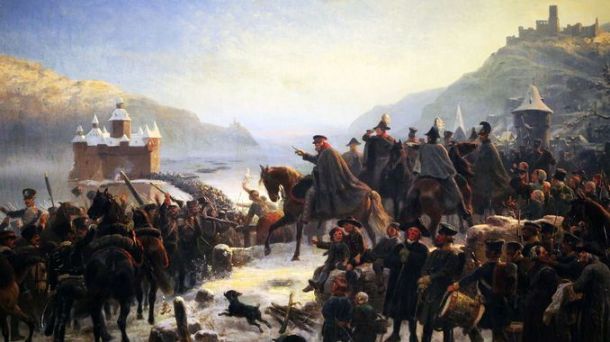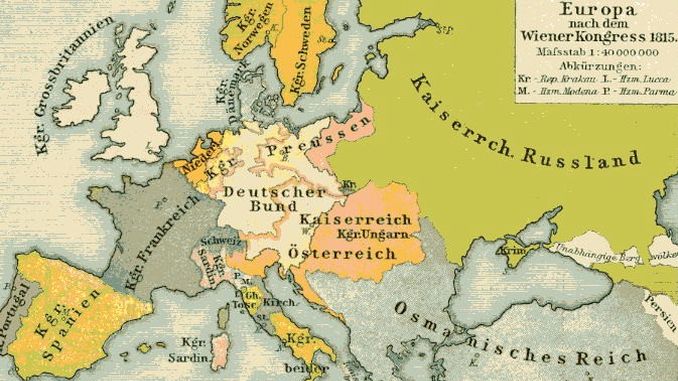
Wars of Liberation
King Frederick William III decreed general conscription and called all men to defend their country against Napoleon, the soldiers fighting in the regular army as well as everyone else who could bear a weapon. A wave of enthusiasm and dedication went through the lands, and many volunteered. New military forces came into being. Men not serving in the regular army joined forces in the Landwehr (defense of the country) regiments and marched with the regular regiments into combat. Another new unit was the Landsturm, a militia. They remained at home to defend their towns and villages.
Volunteers came together in Free Corps (voluntary forces), among them the famous Lützow Free Corps in their black-red-golden uniforms. Men from all over Prussia and the German states fought with him, among them the poet Joseph von Eichendorff. Later these colors became a symbol of freedom and national unity, and eventually the flag of the democratic Germany.
In summer 1813, Prussia, England, Sweden, Austria, and Bavaria stood against Napoleon. In the Battle of Leipzig on October 16-19, 1813, also the “Battle of the Nations”, they defeated Napoleon’s army. The Emperor had to withdraw, and the Confederation of the Rhine fell apart.
Landsturm vom Siebengebirge
The Prussian army pursued the French. The Prussian Major von Boltenstern and his troops came to Königswinter and were met with enthusiasm. On November 10, 1813, the people from Königswinter and other villages formed the militia “Landsturm vom Siebengebirge”. 3,000 armed men protected the right bank of the Rhine River from Bad Honnef to the conjunction of the rivers Rhine and Sieg.

In New Year’s night 1813/14, Prussian troops under field marshal Gebhard Leberecht von Blücher crossed the Rhine at Kaub, Palatinate. The French still held Cologne. On January 3, 1814, the Prussian troops under von Boltenstern and 150 volunteers from the region set out to re-conquer the city. But the attack failed and von Boltenstern lost his life. The same day, Prussian troops and Landsturm men attacked from the Island of Nonnenwerth the French troops on the left side of the Rhine. Josef Genger of the Landsturm died in combat. A memorial on the Drachenfels, the Landsturmdenkmal, reminds us of both, von Boltenstern and Genger.
On January 14, 1814, the French had to withdraw from the Rhine frontier and from Cologne. In March 1814, the left bank was re-conquered. On March 31, 1814, the Allies finally entered Paris. Napoleon had to abdicate and go into exile on the island of Elba. The Bourbon monarchy was restored.

Waterloo and Congress of Vienna
Statesmen from all over Europe convened in the Congress of Vienna to reorganize Europe. But soon rivalries between the Allies arose, and they were at the verge of taking up arms against each other. Suddenly alarming news reached them. On March 1, 1815, Napoleon and some hundred followers had landed in Southern France. Many people hailed him, and troops that should have fought him had defected and joined him. Quickly the allies found an agreement and signed the last act on June 9, 1815, some days before the battle of Waterloo.
One last time Napoleon defeated the Prussian Army. Some days later, at Waterloo, the united Prussian and English armies commanded by Wellington and Blücher defeated him for good. Napoleon had to abdicate a second time and was exiled to the island of St. Helena in the South Atlantic. Here, he died in 1821.
The Rhineland falls to Prussia
After the victory over Napoleon, the Congress of Vienna compensated Prussia for her lost territories. The whole of the Rhineland, Westphalia, and some other territories fell to Prussia. The German states remained and grouped together into a loose “German Federation” (1815-1866). The Congress also reestablished the old feudal order. And yet, the hopes for democracy and national unity remained alive.
A look beyond the Rhineland
After 20 years of war, life in the countryside was very hard: many soils were ruined, there was too little to live on, almost no medical care and infant mortality was very high. In winter 1816/17, it came to a famine after several bad harvests. Today we know that it had to do with the eruption of Mount Tambora in Indonesia. The eruption caused global climate anomalies, and 1816 became a “Year without summer”. Hunger and despair drove many people away from their homes, in those years mass emigration to America began. In the 1830s and 1840s, communities in southwestern Germany went so far as to deport poor people in need of support to America.
Napoleonic Era and Grand Duchy of Berg | Read more
Wikipedia, Napoleonic Wars | Grand Duchy of Berg
References
The photos are from the German Wikipedia, public domain section.

Be the first to comment